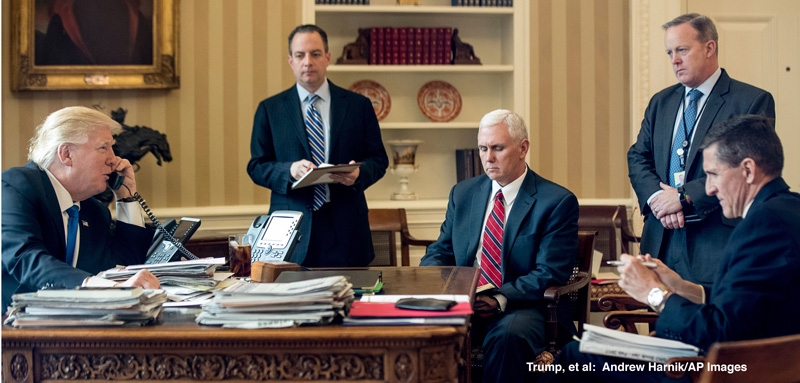- Current Events New Alabama Congressional District Selects Candidates
- Current Events Nebraska Rejects Winner-Take-All Proposal
- Citizenship Voting Under Age 18
- Citizenship Citizenship in Action
- Democratic Party Biden’s and Trump’s Recent Primary Results
- Elections Trump and Biden Win South Carolina and Michigan Primaries

Flynn Resigns as National Security Adviser
On February 13, Michael Flynn resigned from his post as national security adviser, a position he held for less than a month. (He was sworn in on January 22; no Senate confirmation is required for this process.) So what went wrong?
A Rocky Start
During Trump’s presidential campaign, Flynn came under sharp criticism for his anti-Muslim statements and for his verbal attacks on Hillary Clinton (even going so far as to lead chants of “Lock her up” at the Republican National Convention in Cleveland). Since then, he has encouraged Trump’s distrust of the press, openly mocking reporters at times, and maintained an unsettlingly close relationship with Russia. It has also been rumored that Flynn did not get along well with many of Trump’s other top aides, as well as his own National Security Council staffers. However, none of this was enough to lead to Flynn’s resignation.
A Fateful Phone Call
On December 29, 2016, the Obama administration placed new economic sanctions on Russia for its interference in the presidential election. That same day, Flynn had a phone conversation with Sergey Kislyak, the Russian envoy, in which he discussed the sanctions and urged Russia not to retaliate. For the next few weeks, Flynn denied that he had talked about the sanctions during the call. However, several U.S. newspapers revealed that Flynn had not only discussed the sanctions with Kislyak, but had also hinted that President Trump would be willing to lift them. Furthermore, Flynn did not accurately relay the conversation to Vice President Pence and other administration officials. This put Flynn in violation of the Logan Act, which prohibits people outside the executive branch from creating policy with foreign governments.
All of this happened at the same time that the FBI is investigating the role that Russia played in the 2016 presidential election, as well as the role the Trump campaign may have played in the Russian hacking of the DNC. Two days after Flynn resigned, The New York Times reported that intercepted phone calls and records showed that Trump’s associates had had many contacts with senior Russian intelligence officers in the year leading up to the election. Along with Flynn, the FBI is also investigating Carter Page, a foreign policy adviser to Trump’s campaign; Paul Manafort, Trump’s campaign chairman; and Roger Stone, a longtime Republican operative. All of the men have denied the claims against them.
What’s Next?
Now that Flynn has resigned, President Trump will need to appoint a new leader for the National Security Council. His first choice, Vice Admiral Robert Harward, turned down the job. On Monday, Trump announced his latest choice: Lt. General H.R. McMaster, a respected military strategist.
Meanwhile, the House and Senate Intelligence Committees continue to investigate both the Russian hacking and any contacts between Russia and Trump’s campaign during the election. Michael Flynn could face criminal charges as the FBI continues to probe his interactions with Kislyak.


